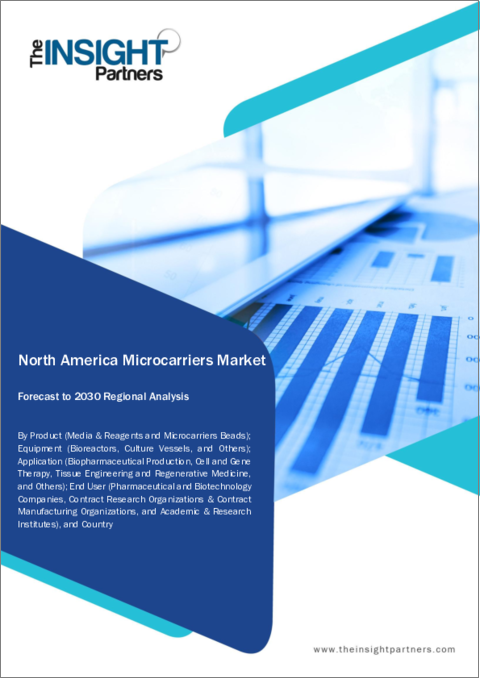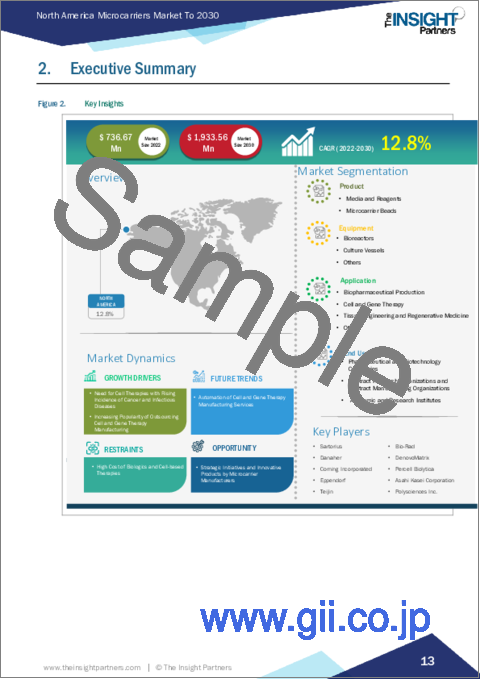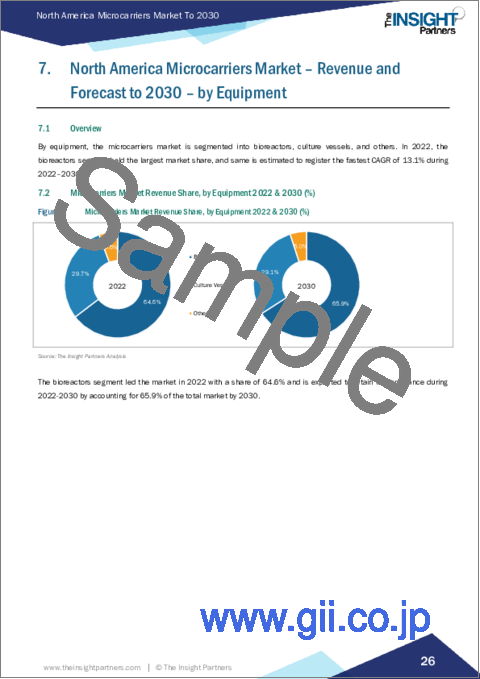|
|
市場調査レポート
商品コード
1494453
北米のマイクロキャリア:2030年市場予測- 地域別分析- 製品、装置、用途、エンドユーザー別North America Microcarriers Market Forecast to 2030 - Regional Analysis - by Product, Equipment, Application, and End User |
||||||
|
|||||||
| 北米のマイクロキャリア:2030年市場予測- 地域別分析- 製品、装置、用途、エンドユーザー別 |
|
出版日: 2024年04月05日
発行: The Insight Partners
ページ情報: 英文 89 Pages
納期: 即納可能
|
全表示
- 概要
- 図表
- 目次
北米のマイクロキャリア市場は、2022年の7億3,667万米ドルから2030年には19億3,356万米ドルに成長すると予想されています。2022年から2030年までのCAGRは12.8%を記録すると推定されています。
細胞・遺伝子治療製造サービスの自動化が北米のマイクロキャリア市場を後押し
細胞・遺伝子治療製造に自動化を取り入れることは、汚染リスクの低減、一貫性の向上、製造コストの削減につながります。Lonza社のCocoonやMiltenyi社のCliniMACS Prodigyシステムは、CAR-Tプロセスのほとんどの連続したユニット操作を1つのシステムで自動化できるように設計された、市場で入手可能な装置の一部です。細胞・遺伝子治療に対する需要の高まりにより、世界的に生産は少量生産から大量生産へとシフトしています。細胞・遺伝子治療の学術的・臨床的環境から大量生産・商業化への進展は、商業的製造における自動化の需要をさらに促進しています。2020年7月、サーモフィッシャーサイエンティフィック社とライエル・イムノファーマ社は、がん患者のための効果的な細胞療法をデザインするプロセスを開発するために提携しました。この提携の下、両社はT細胞の能力向上を目指し、試薬、消耗品、機器とともに、cGMP(current good manufacturing practice)に準拠した統合プラットフォーム(システムとソフトウェア)の開発をサポートします。さらに、米国政府援助機関は、国の生産能力を高めるために、細胞治療の製造に自動化を導入しています。このように、自動化はマイクロキャリア市場の新たな動向として浮上しています。
北米のマイクロキャリア市場概要
北米のマイクロキャリア市場は米国、カナダ、メキシコに区分されます。この地域では米国が市場を独占しています。北米のマイクロキャリア市場の成長は、バイオテクノロジーおよびバイオ医薬品企業による製品上市の増加、主要市場企業の存在、さまざまな学術研究機関による広範な研究開発に起因しています。慢性疾患の有病率の上昇は、米国におけるマイクロキャリア市場の成長を促進する主要因です。米国疾病予防管理センター(CDC)によると、米国人の10人に6人は、心臓病や脳卒中、がん、糖尿病など、少なくとも1つの慢性疾患を抱えて生活しています。これらの疾患は、米国における死亡や身体障害の重大な原因であり、ヘルスケアに多大な費用をもたらします。細胞・遺伝子治療(CGT)の分野では広範な臨床開発が行われており、そのおかげで過去5年間にこれらの治療法の適用範囲は拡大しました。2016年から2021年の分析期間中に12の新しい治療法が承認され、2,900を超える臨床試験が開始されたことで、CGTのイノベーションに大規模な投資が行われています。遺伝子編集の技術的進歩、それに続く技術の治療効果を評価する臨床試験は、米国のマイクロキャリア市場に利益をもたらしている他の要因です。例えば、ポセイダ・セラピューティクス社は、ロシュ社との提携により開発中の再発・難治性B細胞悪性腫瘍治療用のCD19抗原とCD20抗原の両方を標的とする同社初の同種デュアルCAR-T細胞製品候補であるP-CD19CD20-ALLO1について、米国食品医薬品局(FDA)の治験許可申請を承認されました。2023年4月、新規同種CAR T細胞療法が転移性明細胞腎細胞がん患者において結果を出しました。このように、臨床試験への参加と投資を増やすことで、新しい治療法の採用と利用を加速することができます。テキサス大学MDアンダーソンがんセンターの研究者が第I相試験を主導し、米国がん研究協会(AACR)年次総会(2023年)で発表しました。2023年8月、アステラス製薬とポセイーダ・セラピューティクス社は、がん細胞治療の再定義に取り組むポセイーダ社の前進を支援する戦略的投資を発表しました。アステラス製薬は、複数の固形がんを適応症とする同種CAR T細胞療法であるP-MUC1C-ALLO1に焦点を当てたポセイダの臨床段階プログラムの一つをライセンス供与するため、5,000万米ドルを投資しました。このように、米国では慢性疾患患者の増加や様々な細胞・遺伝子治療の承認に伴い、マイクロキャリアの需要が増加しています。
北米のマイクロキャリア市場の収益と2030年までの予測(金額)
北米のマイクロキャリア市場セグメンテーション
北米のマイクロキャリア市場は、製品、装置、用途、エンドユーザー、国に区分されます。
製品別に見ると、北米のマイクロキャリア市場はマイクロキャリアビーズと培地・試薬に二分されます。2022年の北米のマイクロキャリア市場では、マイクロキャリアビーズセグメントが大きなシェアを占めています。
装置では、北米のマイクロキャリア市場はバイオリアクター、培養容器、その他に区分されます。バイオリアクターセグメントは、2022年に北米のマイクロキャリア市場で最大のシェアを占めました。
用途別では、北米のマイクロキャリア市場はバイオ医薬品生産、細胞・遺伝子治療、組織工学・再生医療、その他に区分されます。2022年の北米のマイクロキャリア市場では、バイオ医薬品生産分野が最大のシェアを占めています。さらに、バイオ医薬品生産セグメントは、治療用タンパク質生産とワクチン生産に分類されます。
エンドユーザーに基づいて、北米のマイクロキャリア市場は製薬&バイオテクノロジー企業、受託研究機関&受託製造機関、学術&研究機関に区分されます。2022年の北米のマイクロキャリア市場では、製薬&バイオテクノロジー企業セグメントが最大シェアを占めています。
国別に見ると、北米のマイクロキャリア市場は米国、カナダ、メキシコに区分されます。米国が2022年の北米のマイクロキャリア市場を独占しました。
Teijin Ltd、Bio-Rad Laboratories Inc、Sartorius AG、Danaher Corp、Corning Inc、Eppendorf SE、旭化成Corp、Polysciences Incは、北米のマイクロキャリア市場で事業を展開する大手企業の一部です。
目次
第1章 イントロダクション
第2章 エグゼクティブサマリー
第3章 調査手法
- 対象範囲
- 2次調査
- 1次調査
第4章 北米のマイクロキャリア市場- 主要産業力学
- 主な市場促進要因
- がんと感染症の増加に伴う細胞治療へのニーズ
- 細胞・遺伝子治療製造のアウトソーシング人気の高まり
- 再生医療導入の急増
- 市場抑制要因
- 生物製剤と細胞ベースの治療薬の高コスト
- 市場機会
- マイクロキャリアメーカーによる戦略的取り組みと革新的製品
- 今後の動向
- 細胞・遺伝子治療製造サービスの自動化
- 影響分析
第5章 マイクロキャリア市場:北米市場分析
- マイクロキャリア市場の売上高、2022年~2030年
第6章 北米のマイクロキャリア市場-2030年までの収益と予測- 製品別
- マイクロキャリアビーズ
- 培地および試薬
第7章 北米のマイクロキャリア市場-2030年までの収益と予測- 装置別
- バイオリアクター
- 培養容器
- その他
第8章 北米のマイクロキャリア市場:2030年までの収益と予測- 用途別
- バイオ医薬品生産
- 細胞・遺伝子治療
- 組織工学と再生医療
- その他
第9章 北米のマイクロキャリア市場:2030年までの収益と予測-エンドユーザー
- 製薬企業およびバイオテクノロジー企業
- 受託研究機関および受託製造機関
- 学術・研究機関
第10章 北米のマイクロキャリア市場:2030年までの収益と予測-国別分析
- 北米
- 米国
- カナダ
- メキシコ
第11章 マイクロキャリア市場-業界情勢
- 有機的成長戦略
- 無機的成長戦略
第12章 企業プロファイル
- Teijin Ltd
- Bio-Rad Laboratories Inc
- Sartorius AG
- Danaher Corp
- Corning Inc
- Eppendorf SE
- Asahi Kasei Corp
- Polysciences Inc
第13章 付録
List Of Tables
- Table 1. Microcarriers Market Segmentation
- Table 2. US Microcarriers Market, by Product - Revenue and Forecast to 2030 (USD Million)
- Table 3. US Microcarriers Market, by Equipment - Revenue and Forecast to 2030 (USD Million)
- Table 4. US Microcarriers Market, by Application - Revenue and Forecast to 2030 (USD Million)
- Table 5. US Microcarriers Market, by Biopharmaceutical Production - Revenue and Forecast to 2030 (USD Million)
- Table 6. US: Microcarriers Market Revenue and Forecast To 2030 (US$ Mn) - End User
- Table 7. Canada Microcarriers Market, by Product - Revenue and Forecast to 2030 (USD Million)
- Table 8. Canada Microcarriers Market, by Equipment - Revenue and Forecast to 2030 (USD Million)
- Table 9. Canada Microcarriers Market, by Application - Revenue and Forecast to 2030 (USD Million)
- Table 10. Canada Microcarriers Market, by Biopharmaceutical Production - Revenue and Forecast to 2030 (USD Million)
- Table 11. Canada: Microcarriers Market Revenue and Forecast To 2030 (US$ Mn) - End User
- Table 12. Mexico Microcarriers Market, by Product - Revenue and Forecast to 2030 (USD Million)
- Table 13. Mexico Microcarriers Market, by Equipment - Revenue and Forecast to 2030 (USD Million)
- Table 14. Mexico Microcarriers Market, by Application - Revenue and Forecast to 2030 (USD Million)
- Table 15. Mexico Microcarriers Market, by Biopharmaceutical Production - Revenue and Forecast to 2030 (USD Million)
- Table 16. Mexico: Microcarriers Market Revenue and Forecast To 2030 (US$ Mn) - End User
- Table 17. Recent Organic Growth Strategies in Microcarriers Market
- Table 18. Recent Inorganic Growth Strategies in the Microcarriers Market
- Table 19. Glossary of Terms
List Of Figures
- Figure 1. Microcarriers Market Segmentation, By Country
- Figure 2. Key Insights
- Figure 3. Microcarriers Market - Key Industry Dynamics
- Figure 4. Impact Analysis of Drivers and Restraints for Microcarriers Market
- Figure 5. Microcarriers Market Revenue (US$ Mn), 2022 - 2030
- Figure 6. Microcarriers Market Revenue Share, by Product 2022 & 2030 (%)
- Figure 7. Microcarrier Beads: Microcarriers Market - Revenue and Forecast to 2030 (US$ Million)
- Figure 8. Media and Reagents: Microcarriers Market - Revenue and Forecast to 2030 (US$ Million)
- Figure 9. Microcarriers Market Revenue Share, by Equipment 2022 & 2030 (%)
- Figure 10. Bioreactors: Microcarriers Market - Revenue and Forecast to 2030 (US$ Million)
- Figure 11. Culture Vessels: Microcarriers Market - Revenue and Forecast to 2030 (US$ Million)
- Figure 12. Others: Microcarriers Market - Revenue and Forecast to 2030 (US$ Million)
- Figure 13. Microcarriers Market Revenue Share, by Application 2022 & 2030 (%)
- Figure 14. Biopharmaceutical Production: Microcarriers Market - Revenue and Forecast to 2030 (US$ Million)
- Figure 15. Therapeutic Protein Production: Microcarriers Market - Revenue and Forecast to 2030 (US$ Million)
- Figure 16. Vaccine Production: Microcarriers Market - Revenue and Forecast to 2030 (US$ Million)
- Figure 17. Cell and Gene Therapy: Microcarriers Market - Revenue and Forecast to 2030 (US$ Million)
- Figure 18. Tissue Engineering and Regenerative Medicine: Microcarriers Market - Revenue and Forecast to 2030 (US$ Million)
- Figure 19. Others: Microcarriers Market - Revenue and Forecast to 2030 (US$ Million)
- Figure 20. North America Microcarriers Market Share by End User - 2022 & 2030 (%)
- Figure 21. Pharmaceutical and Biotechnology Companies: Microcarriers Market Revenue and Forecasts To 2030 (US$ Million)
- Figure 22. Contract Research Organizations and Contract Manufacturing Organizations: Microcarriers Market Revenue and Forecasts To 2030 (US$ Million)
- Figure 23. Academic and Research Institutes: Microcarriers Market Revenue and Forecasts To 2030 (US$ Million)
- Figure 24. Microcarriers Market, 2022 (US$Mn)
- Figure 25. North America: Microcarriers Market, By Countries, 2022 And 2030 (%)
- Figure 26. US: Microcarriers Market Revenue and Forecast to 2030 (US$ Mn)
- Figure 27. Canada: Microcarriers Market Revenue and Forecast to 2030 (US$ Mn)
- Figure 28. Mexico: Microcarriers Market Revenue and Forecast to 2030 (US$ Mn)
The North America microcarriers market is expected to grow from US$ 736.67 million in 2022 to US$ 1,933.56 million by 2030. It is estimated to record a CAGR of 12.8% from 2022 to 2030.
Automation of Cell and Gene Therapy Manufacturing Services Fuels North America Microcarriers Market
Incorporating automation in cell and gene therapy manufacturing would lead to a reduced risk of contamination, improved consistency, and decreased cost of production. Lonza Cocoon and the CliniMACS Prodigy system from Miltenyi are a few of the devices available in the market that have been designed to enable the automation of most sequential unit operations for a CAR-T process within a single system. The rising demand for cell and gene therapies has shifted production from a small-volume process to a large-volume process worldwide. The progress of cell and gene therapy from an academic and clinical setting to mass production and commercialization further propels the demand for automation in commercial manufacturing. In July 2020, Thermo Fisher Scientific Inc. and Lyell Immunopharma partnered to develop processes to design effective cell therapies for cancer patients. Under this partnership, the companies aim to improve the capability of T-cells and support the development of an integrated current good manufacturing practice (cGMP) compliant platform (system and software), along with reagents, consumables, and instruments. Further, the US government-aided organizations are adopting automation in the manufacturing of cell therapies to increase the national production capabilities of the country. Thus, automation is emerging as a new trend in the microcarriers market.
North America Microcarriers Market Overview
The North America microcarriers market is segmented into the US, Canada, and Mexico. The US dominates the market in this region. The growth of the microcarriers market in North America is attributed to the increasing number of product launches by biotechnology and biopharmaceutical companies, the presence of key market players, and extensive R&D by various academic and research institutes. The rising prevalence of chronic diseases is a leading factor propelling the growth of the microcarrier market in the US. According to the Centers for Disease Control and Prevention (CDC), 6 in 10 Americans live with at least 1 chronic disease, such as heart disease and stroke, cancer, or diabetes. These diseases are the significant causes of mortality and disability in the US, and they also lead to significant costs of healthcare. There have been extensive clinical developments in the field of cell and gene therapies (CGT), owing to which the application range of these therapies has expanded in the past 5 years. With the approval of 12 new therapies and the commencement of over 2,900 clinical trials during the analysis period of 2016-2021, there have been extensive investments in CGT innovations. Technological advancements in gene editing, followed by clinical trials to evaluate the therapeutic effectiveness of the technique, are the other factors that have benefitted the microcarriers market in the US. For example, Poseida Therapeutics, Inc. received the US Food and Drug Administration (FDA) approval for its Investigational New Drug (IND) application for P-CD19CD20-ALLO1-the company's first allogeneic dual CAR-T cell product candidate targeting both CD19 and CD20 antigens for the treatment of relapsed or refractory B-cell malignancies-being developed in partnership with Roche. In April 2023, Novel allogeneic CAR T-cell therapy delivered results in patients with metastatic clear cell renal cell carcinoma. Thus, increased participation and investments in clinical trials can accelerate the adoption and availability of new therapies. Researchers at the University of Texas MD Anderson Cancer Center led the Phase I trial and presented at the American Association for Cancer Research (AACR) Annual Meeting 2023. In August 2023, Astellas Pharma Inc. and Poseida Therapeutics, Inc. announced a strategic investment to support the advancement of Poseida's commitment to redefining cancer cell therapy. Astellas invested US$ 50 million to license one of Poseida's clinical-stage programs focusing on P-MUC1C-ALLO1, an allogeneic CAR T-cell therapy for multiple solid tumor indications. Thus, the demand for microcarriers is on the rise in the US with the increasing number of chronic disease cases and approval of different cell and gene therapies.
North America Microcarriers Market Revenue and Forecast to 2030 (US$ Million)
North America Microcarriers Market Segmentation
The North America microcarriers market is segmented into product, equipment, application, end user, and country.
Based on product, the North America microcarriers market is bifurcated into microcarriers beads and media & reagents. The microcarriers beads segment held a larger share of the North America microcarriers market in 2022.
In terms of equipment, the North America microcarriers market is segmented into bioreactors, culture vessels, and others. The bioreactors segment held the largest share of the North America microcarriers market in 2022.
Based on application, the North America microcarriers market is segmented into biopharmaceutical production, cell and gene therapy, tissue engineering and regenerative medicine, and other. The biopharmaceutical production segment held the largest share of the North America microcarriers market in 2022. Further, biopharmaceutical production segment is categorized into therapeutic protein production and vaccine production.
Based on end user, the North America microcarriers market is segmented into pharmaceutical & biotechnology companies, contract research organizations & contract manufacturing organizations, and academic & research institutes. The pharmaceutical & biotechnology companies segment held the largest share of the North America microcarriers market in 2022.
Based on country, the North America microcarriers market is segmented into the US, Canada, and Mexico. The US dominated the North America microcarriers market in 2022.
Teijin Ltd, Bio-Rad Laboratories Inc, Sartorius AG, Danaher Corp, Corning Inc, Eppendorf SE, Asahi Kasei Corp, and Polysciences Inc are some of the leading companies operating in the North America microcarriers market.
Table Of Contents
1. Introduction
- 1.1 The Insight Partners Research Report Guidance
- 1.2 Market Segmentation
2. Executive Summary
3. Research Methodology
- 3.1 Coverage
- 3.2 Secondary Research
- 3.3 Primary Research
4. North America Microcarriers Market - Key Industry Dynamics
- 4.1 Key Market Drivers:
- 4.1.1 Need for Cell Therapies with Rising Incidence of Cancer and Infectious Diseases
- 4.1.2 Increasing Popularity of Outsourcing Cell and Gene Therapy Manufacturing
- 4.1.3 Surge in Adoption of Regenerative Medicine
- 4.2 Market Restraints
- 4.2.1 High Cost of Biologics and Cell-based Therapies
- 4.3 Market Opportunities
- 4.3.1 Strategic Initiatives and Innovative Products by Microcarrier Manufacturers
- 4.4 Future Trends
- 4.4.1 Automation of Cell and Gene Therapy Manufacturing Services
- 4.5 Impact Analysis
5. Microcarriers Market - North America Market Analysis
- 5.1 Microcarriers Market Revenue (US$ Mn), 2022 - 2030
6. North America Microcarriers Market - Revenue and Forecast to 2030 - by Product
- 6.1 Overview
- 6.2 Microcarriers Market Revenue Share, by Product 2022 & 2030 (%)
- 6.3 Microcarrier Beads
- 6.3.1 Overview
- 6.3.2 Microcarrier Beads: Microcarriers Market - Revenue and Forecast to 2030 (US$ Million)
- 6.4 Media and Reagents
- 6.4.1 Overview
- 6.4.2 Media and Reagents: Microcarriers Market - Revenue and Forecast to 2030 (US$ Million)
7. North America Microcarriers Market - Revenue and Forecast to 2030 - by Equipment
- 7.1 Overview
- 7.2 Microcarriers Market Revenue Share, by Equipment 2022 & 2030 (%)
- 7.3 Bioreactors
- 7.3.1 Overview
- 7.3.2 Bioreactors: Microcarriers Market - Revenue and Forecast to 2030 (US$ Million)
- 7.4 Culture Vessels
- 7.4.1 Overview
- 7.4.2 Culture Vessels: Microcarriers Market - Revenue and Forecast to 2030 (US$ Million)
- 7.5 Others
- 7.5.1 Overview
- 7.5.2 Others: Microcarriers Market - Revenue and Forecast to 2030 (US$ Million)
8. North America Microcarriers Market - Revenue and Forecast to 2030 - by Application
- 8.1 Overview
- 8.2 Microcarriers Market Revenue Share, by Application 2022 & 2030 (%)
- 8.3 Biopharmaceutical Production
- 8.3.1 Overview
- 8.3.2 Biopharmaceutical Production: Microcarriers Market - Revenue and Forecast to 2030 (US$ Million)
- 8.3.3 Therapeutic Protein Production: Microcarriers Market - Revenue and Forecast to 2030 (US$ Million)
- 8.3.4 Vaccine Production: Microcarriers Market - Revenue and Forecast to 2030 (US$ Million)
- 8.4 Cell and Gene Therapy
- 8.4.1 Overview
- 8.4.2 Cell and Gene Therapy: Microcarriers Market - Revenue and Forecast to 2030 (US$ Million)
- 8.5 Tissue Engineering and Regenerative Medicine
- 8.5.1 Overview
- 8.5.2 Tissue Engineering and Regenerative Medicine: Microcarriers Market - Revenue and Forecast to 2030 (US$ Million)
- 8.6 Others
- 8.6.1 Overview
- 8.6.2 Others: Microcarriers Market - Revenue and Forecast to 2030 (US$ Million)
9. North America Microcarriers Market Revenue and Forecasts To 2030 - End User
- 9.1 Overview
- 9.2 North America Microcarriers Market Share by End User - 2022 & 2030 (%)
- 9.3 Pharmaceutical and Biotechnology Companies
- 9.3.1 Overview
- 9.3.2 Pharmaceutical and Biotechnology Companies: Microcarriers Market- Revenue and Forecast to 2030 (US$ Million)
- 9.4 Contract Research Organizations and Contract Manufacturing Organizations
- 9.4.1 Overview
- 9.4.2 Contract Research Organizations and Contract Manufacturing Organizations: Microcarriers Market- Revenue and Forecast to 2028 (US$ Million)
- 9.5 Academic and Research Institutes
- 9.5.1 Overview
- 9.5.2 Academic and Research Institutes: Microcarriers Market- Revenue and Forecast to 2028 (US$ Million)
10. North America Microcarriers Market Revenue and Forecasts to 2030 - Country Analysis
- 10.1 North America Microcarriers Market, Revenue and Forecast To 2030
- 10.1.1 Overview
- 10.1.2 North America: Microcarriers Market, by Country
- 10.1.2.1 US
- 10.1.2.1.1 Overview
- 10.1.2.1.2 US: Microcarriers Market Revenue and Forecast to 2030 (US$ Mn)
- 10.1.2.1.3 US: Microcarriers Market, by Product
- 10.1.2.1.4 US: Microcarriers Market, by Equipment
- 10.1.2.1.5 US: Microcarriers Market, by Application
- 10.1.2.1.5.1 US: Microcarriers Market, by Biopharmaceutical Production
- 10.1.2.1.6 US: Microcarriers Market, by End User
- 10.1.2.2 Canada
- 10.1.2.2.1 Overview
- 10.1.2.2.2 Canada: Microcarriers Market Revenue and Forecast to 2030 (US$ Mn)
- 10.1.2.2.3 Canada: Microcarriers Market, by Product
- 10.1.2.2.4 Canada: Microcarriers Market, by Equipment
- 10.1.2.2.5 Canada: Microcarriers Market, by Application
- 10.1.2.2.5.1 Canada: Microcarriers Market, by Biopharmaceutical Production
- 10.1.2.2.6 Canada: Microcarriers Market, by End User
- 10.1.2.3 Mexico
- 10.1.2.3.1 Overview
- 10.1.2.3.2 Mexico: Microcarriers Market Revenue and Forecast to 2030 (US$ Mn)
- 10.1.2.3.3 Mexico: Microcarriers Market, by Product
- 10.1.2.3.4 Mexico: Microcarriers Market, by Equipment
- 10.1.2.3.5 Mexico: Microcarriers Market, by Application
- 10.1.2.3.5.1 Mexico: Microcarriers Market, by Biopharmaceutical Production
- 10.1.2.3.6 Mexico: Microcarriers Market, by End User
- 10.1.2.1 US
11. Microcarriers Market-Industry Landscape
- 11.1 Overview
- 11.2 Organic Growth Strategies
- 11.2.1 Overview
- 11.3 Inorganic Growth Strategies
- 11.3.1 Overview
12. Company Profiles
- 12.1 Teijin Ltd
- 12.1.1 Key Facts
- 12.1.2 Business Description
- 12.1.3 Products and Services
- 12.1.4 Financial Overview
- 12.1.5 SWOT Analysis
- 12.1.6 Key Developments
- 12.2 Bio-Rad Laboratories Inc
- 12.2.1 Key Facts
- 12.2.2 Business Description
- 12.2.3 Products and Services
- 12.2.4 Financial Overview
- 12.2.5 SWOT Analysis
- 12.2.6 Key Developments
- 12.3 Sartorius AG
- 12.3.1 Key Facts
- 12.3.2 Business Description
- 12.3.3 Products and Services
- 12.3.4 Financial Overview
- 12.3.5 SWOT Analysis
- 12.3.6 Key Developments
- 12.4 Danaher Corp
- 12.4.1 Key Facts
- 12.4.2 Business Description
- 12.4.3 Products and Services
- 12.4.4 Financial Overview
- 12.4.5 SWOT Analysis
- 12.4.6 Key Developments
- 12.5 Corning Inc
- 12.5.1 Key Facts
- 12.5.2 Business Description
- 12.5.3 Products and Services
- 12.5.4 Financial Overview
- 12.5.5 SWOT Analysis
- 12.5.6 Key Developments
- 12.6 Eppendorf SE
- 12.6.1 Key Facts
- 12.6.2 Business Description
- 12.6.3 Products and Services
- 12.6.4 Financial Overview
- 12.6.5 SWOT Analysis
- 12.6.6 Key Developments
- 12.7 Asahi Kasei Corp
- 12.7.1 Key Facts
- 12.7.2 Business Description
- 12.7.3 Products and Services
- 12.7.4 Financial Overview
- 12.7.5 SWOT Analysis
- 12.7.6 Key Developments
- 12.8 Polysciences Inc
- 12.8.1 Key Facts
- 12.8.2 Business Description
- 12.8.3 Products and Services
- 12.8.4 Financial Overview
- 12.8.5 SWOT Analysis
- 12.8.6 Key Developments
13. Appendix
- 13.1 About the Insight Partners
- 13.2 Glossary of Terms






